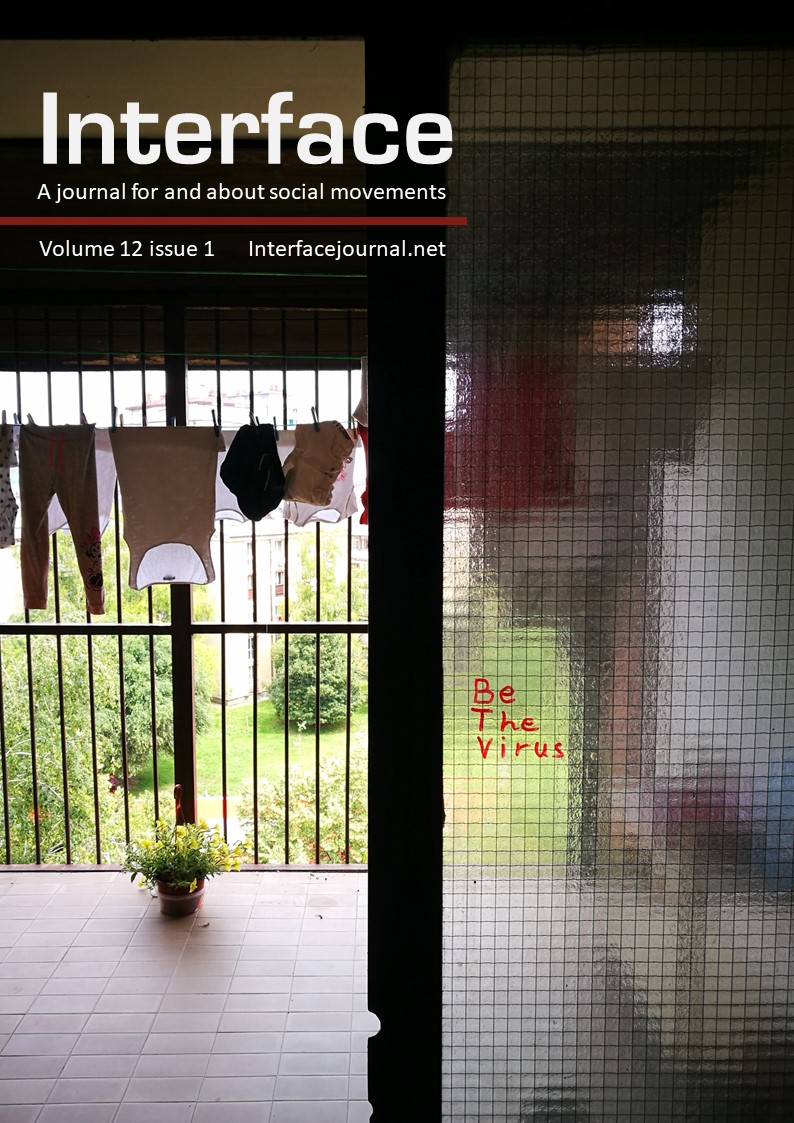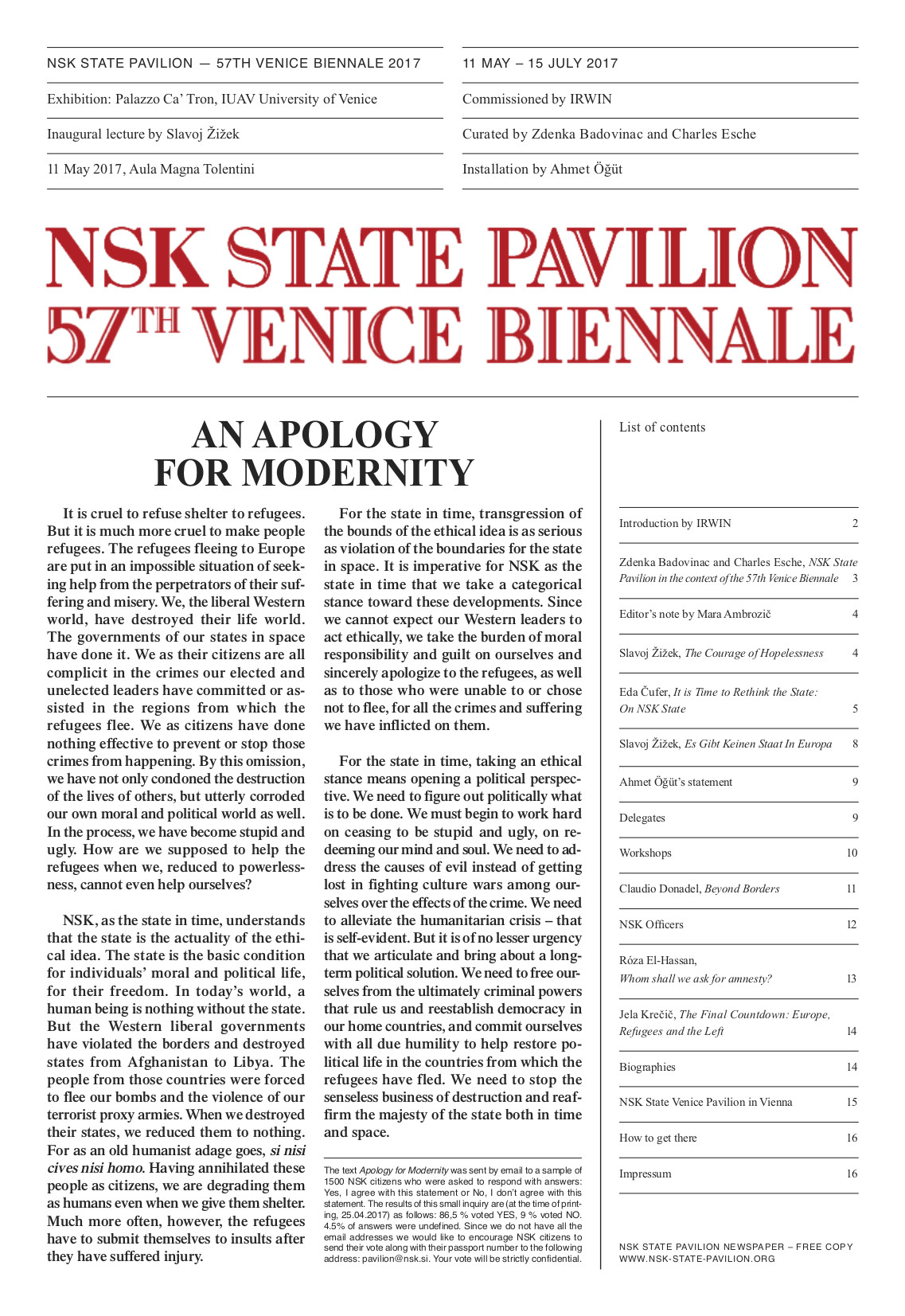Interface, 12(1): Organizing amidst COVID-19: Sharing Stories of Struggle (2020)
Filed under journal | Tags: · activism, art, contagion, ecology, feminism, food, internationalism, labour, lgbtq, migration, pandemic, quarantine, refugees, resistance, social movements, solidarity, virus

“The world is on fire, with both fever and flame. After a few months of lockdown, things are erupting in new ways. The movement for Black Lives is demanding an end to anti-Black racism and conversations about abolishing the police are on late night television. In North America, a new world appears to be dawning, one that didn’t seem possible even a month ago. Meanwhile, in the new centre of global capitalism, the long-standing Hong Kong movement seems to be on the point of succumbing to a new wave of repression.
Around the world, movements are strategizing about how to ensure that no one is left behind. In April we put out a call for short pieces on this theme. We could see that the imminent arrival of the virus had generated many different struggles – initially pressure to force some states to take action in the first place, resistance to cuts and demanding benefits. Then came struggles characterized by mutual aid, efforts to protect essential workers, and the most vulnerable, such as the homeless, prisoners, the elderly and the undocumented.
This issue contains pieces originally written for our rolling coverage of movements in the virus, as well as a few pieces written especially for this special issue. They represent reflective activists and engaged researchers trying to grasp what their movements were doing, and what they should do, in an unprecedented situation.
The contributions reflect on movements in Argentina, Australia, Austria, Belize, Bosnia and Herzegovina, Brazil, Canada, China, Denmark, Egypt, France, Germany, Greece, Haiti, India, Iran, Ireland, Italy, Japan, Kenya, Mexico, Morocco, Pakistan, Russia, Serbia, Singapore, Spain, Switzerland, Syria, Turkey, the UK, the US and globally and are written in English, French, Portuguese and Spanish.” (from Editorial)
Edited by Sutapa Chattopadhyay, Lesley Wood, and Laurence Cox
Publisher Interface, July 2020
ISSN 2009-2431
683 pages
Sandi Hilal, Alessandro Petti: Permanent Temporariness (2018)
Filed under book, catalogue | Tags: · architecture, borders, commons, decolonization, exile, hospitality, palestine, participation, politics, refugees

“Since their first work, Stateless Nation at the Venice Biennial in 2003, and throughout their more recent architectural interventions in refugee camps, the artistic practice of Sandi Hilal and Alessandro Petti has explored and acted within and against the condition of permanent temporariness that permeates contemporary forms of life. In their ambitious research and project-based practice, art exhibitions are both sites of display and sites of action that spill over into other contexts: built architectural structures, the shaping of critical learning environments, interventions that challenge dominant collective narratives, the production of new political imaginations, the re-definition of words, and the formation of civic spaces.
This book is organized around fourteen concepts that activate seventeen different projects. Each project is the result of a larger process of collaboration and is accompanied by individual and collective texts and interviews that contextualize and expand the reach of every intervention.
Contributors to projects and texts include Maria Nadotti, Charles Esche, Robert Latham, Salwa Mikdadi, Eyal Weizman, Okwui Enwezor, Munir Fasheh, Grupo Contrafilé, Murad Odeh, and Rana Abughannam.”
Publisher Art and Theory Publishing, Stockholm, and Royal Institute of Art, Stockholm, 2018
ISBN 9789188031709, 9188031705
384 pages
via authors
NSK State Pavilion: 57th Venice Biennale (2017)
Filed under newspaper | Tags: · art, borders, migration, refugees

“NSK State in Time was founded by artist collective Neue Slowenische Kunst (NSK) in 1992. It was conceived as a utopian formation, which would have no physical territory and would not be identified with any existing nation state. Along with organising temporary embassies and consulates in cities such as Moscow, Berlin, Florence, Sarajevo and New York, NSK State in Time began issuing passports in 1993. There are currently about 15,000 NSK Passport holders around the world, with well known citizens including including Marina Abramović, John Baldessari, Boris Groys, Hans Ulrich Obrist and Slavoj Žižek.
The NSK State Pavilion provided an added and new dimension to NSK State in Time, built upon a collaboration with migrant communities, humanitarian protection applicants, and stateless individuals who are looking for new citizenship. At the Venice Biennale, the project aimed to rethink what a contemporary state can be, offering an open form of citizenship which contrasts with that generated by spatially-defined states.”
With contributions by Zdenka Badovinovac and Charles Esche, Eda Čufer, Claudio Donadel, Róza El-Hassan, Jela Krečič, and Slavoj Žižek.
Edited by Mara Ambrožič
Publisher Irwin, 2017
16 pages

